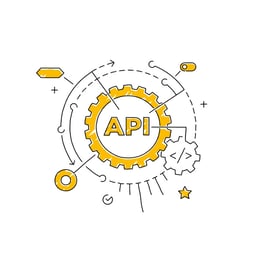Updated: August 6, 2024
|
Published: July 15, 2021
Can large companies use HubSpot?

Listen to the audio version
In This Article +
Is HubSpot only for smaller startups? We get this question a lot.
HubSpot is often touted as a tool for small- and medium-sized businesses, but is the platform effective for larger organizations?
Let us explore.
In essence, HubSpot is marketing automation and a customer relationship management (CRM) platform. It is designed to help businesses attract visitors, generate leads, and transform them into customers. HubSpot provides features galore for email, social media, content marketing,
SEO, and web analytics. Its CRM capabilities are very robust, as well.
Additionally, a less known, yet incredibly powerful product is HubSpot CMS. This is the only CMS designed with marketers in mind. In fact, HubSpot used to refer to the product as HubSpot COS (Content Optimization System) instead of CMS, knowing that all things marketing are centered around content.
Additionally, a less known yet powerful feature is HubSpot CMS. In fact, HubSpot refers to it as the COS (Content Optimization System). This is the only CMS that was designed with marketing folks in mind.
So going back to the size of HubSpot’s customers – it’s true that the platform is an optimal solution for small businesses. Indeed, HubSpot clients are often SMBs and startups; however, the platform works amazingly well for large organizations, too.
What Large Organizations Use HubSpot?
More than 113,000 companies around the world currently use HubSpot. Although small- and medium-sized businesses are the major players who use this platform, large organizations thrive happily on it as well. Here are a few of them:
- Trello, a Kanban-style application that keeps businesses organized
- BBC, a UK-based news organization
- Lucidchart, a web-based platform that allows teams to collaborate on drawings, diagrams, and other visual assets
- Suzuki, an automobile manufacturer
- Headspace, a meditation app
- Airstream, an RV manufacturer
- San Francisco Chronicle, a Bay Area newspaper (let’s add a local business to the mix :)
As you can see, HubSpot works for large companies across a variety of industries.
How Can Large Companies Benefit from HubSpot?
Large companies have a few different CMS and marketing automation platforms to choose from, but HubSpot deserves serious consideration. In 2019, HubSpot moved up in the Challengers Quadrant to the border of Leaders, a position it has maintained since:

Here are some important reasons why large companies can benefit from HubSpot:
1. HubSpot Offers a Robust CMS
You may not know that HubSpot not only offers a CMS, but it also happens to be one of the best on the market with its own global network of CDNs, which make your website load fast. Why is this important? Slow-loading websites can dramatically decrease conversion rates by up to 40%, as Neal Patel eloquently points out in his website.
HubSpot’s CMS enables you to build websites that are secure, SEO-optimized, and powerful as well. Using the CMS, you can manage your content and marketing all in a single place, which, naturally, allows for so many advantages.
In addition to being mobile responsiveness and designed with the latest UX practices in mind, HubSpot’s themes allow you to personalize the experience of every visitor, which enhances the user experience.
2. HubSpot Is the Complete Package
HubSpot is a one-stop solution for your digital marketing, sales, and CRM processes, as well as CMS. It is a single platform that accommodates various tools, whether internal or external, and every single thing is centralized — exactly what many large businesses have dreamed of. Here’s how HubSpot refers to it in their own article — “A united platform to help you grow better.”
With HubSpot, you can manage the creation of blog posts, landing pages, email campaigns, and more. The platform includes a variety of analytical tools and reports so that you can see which content is effective and which is not. It’s also possible to manage your social media needs from within HubSpot.
HubSpot has played a pivotal role in closing the gap in aligning marketing and sales needs so that both divisions can work in tandem toward the same objectives. Among its many integrations, HubSpot works well with Salesforce. You can also manage your ad campaigns from the HubSpot marketing hub. And more information on the enterprise product can be found at HubSpot Enterprise CRM portal.
On top of it all, instead of operating in silos (and let’s face it – a lot of enterprise-level orgs end up isolating teams), HubSpot provides amazing team collaboration capabilities.
3. Sophisticated Automation
Large organizations often get bogged down with repetitive and tedious tasks like managing social media accounts, creating email campaigns and responders, and dealing with many other recurring and time-consuming marketing needs. With HubSpot’s marketing automation tools, you can put your marketing tasks on autopilot and work smarter.
HubSpot offers sophisticated automation and personalization tools. They allow you to tailor your emails, offers, and content recommendations based on users’ actions on the site. This saves companies valuable money and time while helping them nurture leads throughout the purchasing process.
Whether you are a large or small business, marketing automation helps boost communication between your business and your customers. Website visitors get all of the content they require at the precise moment they need it. In short, your business can accomplish its goals faster by making use of HubSpot’s marketing automation system.
4. Deep Personalization
Personalization for consumers is critical to operating a completely functional and thriving inbound marketing strategy. Personalization helps maintain a strong relationship between customers and businesses. However, some businesses are unaware that HubSpot offers excellent tools in this department.
As discussed briefly above, HubSpot does allow you to fully personalize your content (including website pages, emails, and landing pages) in many ways, such as by filling in the company or individual’s name, serving content based on customer actions, and more. Whether someone is visiting your site for the very first time or they’re on the verge of making a purchase, HubSpot’s smart content system puts the right content in front of them.
5. API Integrations
For large organizations, it’s necessary to be ahead of the curve, and HubSpot’s app integration feature allows them to do that, with tools like Google Calendar, SurveyMonkey, and Jira. There are more than 750 app integrations that can help businesses build more robust websites, and if there’s one that’s missing, large organizations can simply create their own. And if there isn’t a native HubSpot API integration available, there are devs who can help.
6. Out-of-the-Box Responsiveness
Mobile-first is the way Google rolls nowadays. And for a good reason. HubSpot CMS websites are out-of-the-box responsive.
HubSpot uses 100% responsive design within its CMS. With all of the premade templates, all content is optimized automatically for users on any device. With some CSS modifications, more intricate custom designs can be made responsive as well.
The Bottom Line
In short, HubSpot is not limited to small or midsized companies and businesses. Large enterprises and businesses can leverage the platform for centralized, powerful marketing automation. However, as Lean Labs detailed: “HubSpot isn’t for everyone. Even though we’re huge fans of HubSpot software, we recognize that different companies have different needs, and there are barriers to HubSpot adoption to some companies.” This is true. We do, however, feel that given how robust HubSpot’s API is – a company size is just a number. HubSpot runs on HubSpot. We’ll leave it at that.

.png?width=343&height=334&name=Frame%20(3).png)
.png?width=343&height=479&name=Frame%20(4).png)




.png?width=204&height=62&name=Frame%20(13).png)
.png?width=204&height=62&name=Frame%20(18).png)
.png?width=204&height=62&name=Frame%20(11).png)
.png?width=204&height=62&name=Frame%20(12).png)
.png?width=204&height=62&name=Frame%20(15).png)
.png?width=204&height=62&name=Frame%20(16).png)
.png?width=204&height=62&name=Frame%20(17).png)
.png?width=194&height=62&name=Frame%20(20).png)